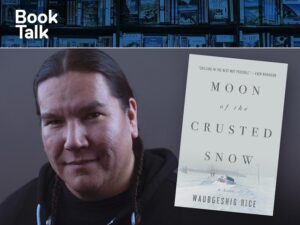Rice discusses sequel to best-selling book during alumni week activities at alma mater

By Sam Laskaris
SUDBURY – Waubgeshig Rice is spending a good chunk of his days now working on a sequel to his national bestseller.
Rice, an author and journalist who is a member of Wasauksing First Nation, had his third book, Moon of the Crusted Snow, published back in 2018.
The book, about an apocalyptic story that also focuses on the survival and resilience of Indigenous people, was a huge success, to the extent it surprised Rice himself.
“No, not at all,” Rice said about whether he anticipated how well his book would be received. “I did not anticipate that. I feel very fortunate that the book has garnered so much attention and a bit of acclaim.”
Rice, who now lives in Sudbury with his wife and two sons, spoke at a book talk hosted by his alma mater, Ryerson University in Toronto, on Sept. 30.
The event hosted by the school’s alumni relations department was one of the activities during alumni week staged by the university.
Duncan McCue, a member of Chippewas of Georgina Island First Nation, moderated the talk. McCue, an award-winning CBC journalist is also a Journalist in Residence at the university.
Coincidentally, Rice’s talk was held on the first National Day for Truth and Reconciliation.
Rice was also previously employed at the CBC. But he left the company in 2020 because of the success of Moon of the Crusted Snow.
“That is the reason why I left CBC because I was offered a publishing contract through Penguin Random House to work on a sequel,” he said.
Rice had a radio hosting gig in Sudbury with the CBC when he made the decision last year to leave in order to concentrate on his writing career.
Rice said there is no set publishing date for his sequel to Moon of the Crusted Snow but it will be a year from now.
“Basically, part two picks up 10 years after the end of the first book,” he said. “You’ll see a lot of the same characters, in fact, most of the same characters.”
During his talk, Rice also discussed the inspiration for his best-selling book.
“The main event that inspired it was the blackout of August of 2003 that impacted much of the eastern part of North America,” he said. “I was living in Toronto at the time, working as a freelance journalist but that day, I was in Wasauksing housesitting for my dad and step-mom who were on summer holidays.”
During the blackout, Rice was with his two younger brothers and collectively they instigated a survival plan and who to help.
“It was very comforting to know we were surrounded by people with land-based knowledge who would be okay if the power didn’t come back on,” he said.
Upon returning to Toronto, Rice discovered the worried experiences of those during the blackout varied considerably from what he had been through.
“I’ve always been a fan of post-apocalyptic and dystopian fiction,” Rice said. “And a lot of the books I read up until that point in my life, they didn’t really offer a hopeful look to the future or ways for the protagonist to build community with other characters they met along the way…. The idea stayed with me for many, many years. [But] I didn’t start writing it until more than a decade later.”
During his book talk, Rice also offered advice to young Indigenous writers.
“I think you should just keep writing, keep honing those skills, write your story, write your truth,” he said. “Don’t worry about anything else until afterwards. Just make sure you get that story down and just practice as much as you can every day.”
He also recommended that Indigenous writers looking for ways to get their works into print should explore the numerous Indigenous publishers who are out there and also seek information about granting programs available.
“There is a very concerted effort now to get the stories of Indigenous communities out there,” he said.


